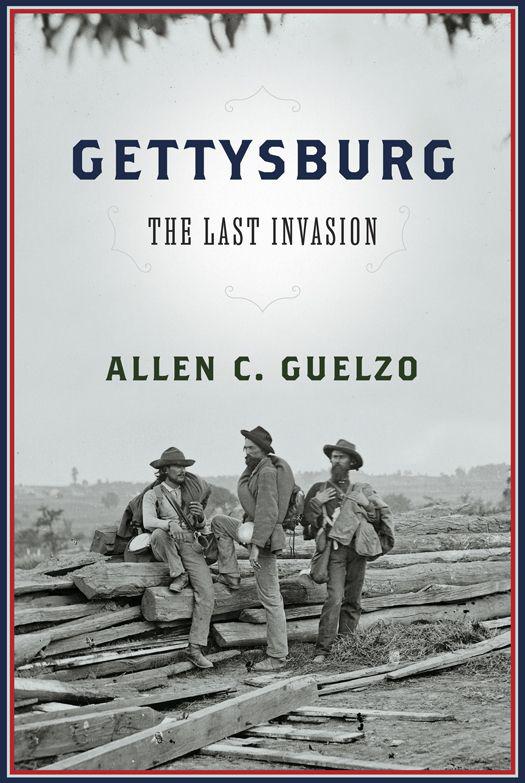
Gettysburg
The Last Invasion
کتاب های مرتبط
- اطلاعات
- نقد و بررسی
- دیدگاه کاربران
نقد و بررسی

Starred review from June 3, 2013
Esteemed Civil War scholar Guelzo (Lincoln and Douglas) delivers a dense, impressively detailed account of the Civil War's turning point and bloodiest battle. Beginning shortly before the days of the actual engagement, his tome explores all aspects of Gettysburg as a military endeavor and the events that led to it. He addresses politics within the Union and the Confederate governments and armies, the personalities of major players and units, and places all within a greater historical and global context. Guelzo's beautiful prose transforms straightforward facts into a visceral, if gruesome, picture of the time and place (depictions of the injured and dead are as detailed as the discussions of military or political strategy), and supplementary maps and photographs aid visualization. Even while presenting the smallest details Guelzo contributes to a greater understanding of complexities of the battle and the Civil War as a wholeâof particular note is a soldier's memory of opposing army bandsmen simultaneously playing "Home, Sweet Home" one night across the banks of the Rappahannock River from one another. While the sheer length and level of required engagement with the text make it not for everyone, readers who are willing to dedicate the time to read it will find this book enriching and enlightening.

Starred review from April 15, 2013
A stirring account of the "greatest and most violent collision the North American continent [has] ever seen," just in time for the 150th anniversary of the Battle of Gettysburg. Though the battle site was not inevitable, the actual battle was: The giant armies of North and South were destined to lumber into one another in a time when, as Guelzo (Fateful Lightning: A New History of the Civil War and Reconstruction, 2012, etc.) cites a Confederate officer as observing, they "knew no more about the topography of the country than they did about Central Africa." What is certain is that Robert E. Lee's arrival in Pennsylvania sent "Yankeedom," to quote another Confederate officer, "in a great fright." The Union had reason to be concerned, but, as Guelzo documents, their foe was scattered and divided, with rivalries and miscommunication--and perhaps even insubordination--keeping James Longstreet from attacking, J.E.B. Stuart from arriving on the battlefield in time, and the much-disliked George Pickett from enjoying a better fate than being cannon fodder. And what fodder: If there is a leitmotif in Guelzo's book, it is the image of brains being distributed on the grass and the shirts of fellow soldiers, of limbs disappearing and soldiers on both sides disintegrating in a scene of "muskets, swords, haversacks, human flesh and bones flying and dangling in the air or bouncing above the earth." The author ably, even vividly, captures the hell of the battlefield while constantly keeping the larger scope of Gettysburg in the reader's mind: It was, he argues, the one central struggle over one plank of the Civil War, namely the preservation of the Union, that nearly wholly excluded the other one, the abolition of slavery. Robust, memorable reading that will appeal to Civil War buffs, professional historians and general readers alike.
COPYRIGHT(2013) Kirkus Reviews, ALL RIGHTS RESERVED.

Starred review from May 15, 2013
Much ink has been spilled over the Battle of Gettysburg. Readers might think there is little left to say and no fresh way of saying it, but Guelzo (Henry R. Luce Professor of the Civil War Era, Gettysburg Coll.; Lincoln's Emancipation Proclamation) proves such skeptics wrong with his riveting account of both the events leading up to the battle and the battle itself. Refreshingly, he makes clear that this account is his own: in any battle analysis a historian must weigh unclear and sometimes contradictory accounts by participants who could only see and interpret (or misinterpret) events in their own immediate vicinity. Using a wealth of 19th-century sources, from letters and diaries to regimental histories to the indispensable "Official Records" series, Guelzo has composed a narrative that is detailed and compelling on a human level but easy to follow on an operational and tactical one. Readers will discover Guelzo's own distinctive positions, defended by citations, such as that bayonet charges were frequent and often effective in 19th-century warfare. The lack of a bibliography will be a sore point for some serious readers. VERDICT A triumph of source use and presentation, engaging for the general reader but rigorous enough for the scholar. Highly recommended.--Richard Fraser, Univ. of California, Los Angeles, Libs.
Copyright 2013 Library Journal, LLC Used with permission.

Starred review from May 1, 2013
Few battles provoke debate like Gettysburg, whose bibliography exceeds 6,000 items. One more won't settle the what-ifs, but Guelzo's entry identifies key controversies, trenchantly advocates its interpretations, and rests on a sensible foundation, the confusion of a Civil War battle. A noisome cacophony opaque with smoke, the Gettysburg battlefield allowed officers and soldiers only fragmentary glimpses of the action, limiting their situational awareness to their immediate surroundings. Wary, moreover, of postwar memoirists' tendencies to justify themselves or fault others, Guelzo constructs his Gettysburg as much as possible from contemporaneous sources like orders, reports, and letters. His result reads like the battle might have been experienced, as an episodic series of terrifying minibattles directed by colonels and fought by regiments, whose clashes guided the outcome more than anything done by the respective army commanders on the scene. Rather dismissive of Union general Meade, Guelzo derogates Confederate general Lee less for his decisions at Gettysburg than for failing to strategically arrange a defensive battle and falling into the offensive one that developed. A political historian of the Civil War (Lincoln and Douglas, 2008), Guelzo demonstrates versatile historical skill in this superior treatment of Gettysburg.(Reprinted with permission of Booklist, copyright 2013, American Library Association.)

























دیدگاه کاربران